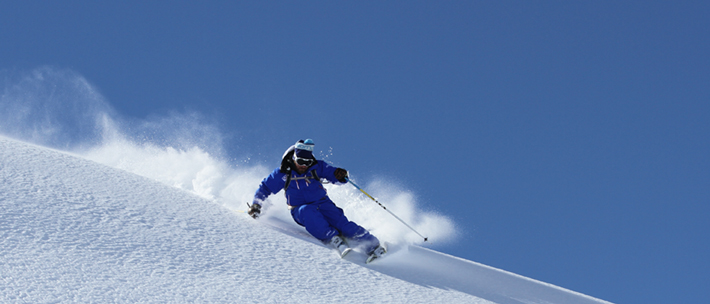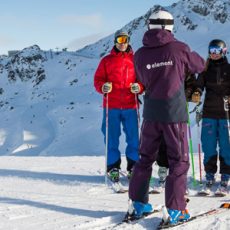 The ISIA qualification may seem like a daunting prospect for those thinking of taking their skiing and instructing to the next level.
The ISIA qualification may seem like a daunting prospect for those thinking of taking their skiing and instructing to the next level.
However, once you break down the different elements of the BASI Level 3 qualification and fully understand what is required it feels a lot more manageable.
The ISIA is a modular course that consists of 5 different exams and a second language test. As a pre-requisite you’ll need 200 hours of teaching experience to book on to some exams.
The five different exams that you’ll need to pass are:
- Technical exam
- Teaching exam
- Mountain Safety
- Second discipline level 1
- BASI coaching course
The technical and teaching exams are the key components of the ISIA and this is where people are most likely to trip up. These should be the main focus for your training. We’ve noticed that people benefit massively from focused training for these courses rather than just attending the exams a number of times.
Beyond the Tech and Teach there is the Mountain Safety (a six day course), your Second Discipline (a five day Level 1 course), and the race coach (a five day course).
These are generally more introductory level courses and so can be fitted in around your training and preparation for the technical and teaching exams.
The Tech

First up is the technical exam.
This is a five day exam on snow where you will be assessed on your skiing ability. You will be assessed on your ability to perform precise and accurate demonstrations of the Central Theme and beyond the Central Theme in shorts turns, long turns, bumps, variables and steeps.
There is a significant jump in expectations for this course compared with the technical element of the Level 2, so we recommend you take your time and don’t rush booking it.
Preparation is key and although there is a training element to the course, you want to be going into the first day very close to, or already at, the required level.
A common mistake people make is booking the course too early and as such end up attending the exam a number of times before passing. It’s far more energy efficient (and financially efficient) to book some training and attend the course when you have been told you’re ready.
This way you can train and improve without the pressure of an exam looming – avoiding unnecessary pressure makes training far more fun too!
Signing up for a training course might seem expensive, but when you compare it against the possible cost of taking your exam when you’re underprepared it’s a worthwhile investment – especially if you want to progress in the skiing industry.
As well as excellent preparation for the ISIA exams you will put yourself at far more of an advantage for the BASI Level 4 technical exam. That’s because the requirements are very similar to the Level 3, but just on steeper terrain in more challenging environments.
The Teach

For the teaching exam it is worth waiting a little longer after your BASI Level 2 – this will give you more of a chance to get more teaching experience and to enhance your knowledge and understanding through your technical training.
Again this is a five day course and you will be assessed on your knowledge and understanding of the central theme and beyond, your ability to run sessions aimed at the ability level of your peers on the course and also your performance analysis.
You need to be able to improve and challenge everyone in your group, so it’s important to spend time practicing video analysis and training your eye.
The Mountain Safety

The Mountain Safety exam is set up with four days of training followed by two days of assessment.
It is a fantastic course and you will learn a lot of new information, which is not only useful as an instructor, but also for yourself as an off-piste skier. You will become more adept at leading off-piste and learn all about navigation, weather and avalanche risk.
This will allow you to be more knowledgeable and make better decisions when enjoying skiing powder and exploring the mountain with your clients and friends – as well as prepare you for the European Mountain Safety that is part of the BASI Level 4 ISTD qualification.
The Second Discipline

The second discipline is where you are required to pass a Level 1 instructor’s exam in another discipline such as Snowboarding, Telemark, Adaptive or Nordic.
The key point here is that you should select a discipline that you enjoy and may see yourself teaching in the future. Some of these disciplines can be more useful than others to ski schools that you may work for.
For example, it is common to be asked to take a snowboard lesson or be asked to take a lesson with a student with learning difficulties.
So depending on which you choose you could create more work for yourself in the future.
Race Coach

Finally, there is the Race Coach course. You will be assessed on your knowledge and ability to run competition training and you will have to set both a slalom and GS course, both within the FIS rules.
Again this is a fairly introductory course but pot to be taken lightly. It’s also a really useful course to help you develop your eye for GS when you come to train for your Eurotest.
In summary…
Train hard for the technical exam, hold off on the teaching exam until you have some teaching experience and have spend some time developing your knowledge through technical exam preparation. You can also consider getting your second discipline done in a snow dome in the summertime, then fit the race coach and mountain safety into your winter training plans when you have time.

There is no right way to progress as a ski instructor and climb the ranks, there are many ways to tackle the BASI Level 3 and it’s important to work out what is best for you.
Ask yourself are you in a position to do a season of training? Or would you prefer to do a work and train programme? Or are you prepared enough already to do a couple of crash course weeks prior to the exam?
If you plan to do an ISIA programme to help you train for these exams then it is important to work out the best option for you to succeed. Every trainee will approach the ISIA in a slightly different way depending on your skiing ability and personal finances.
Concept ISIA Training
Concept is our Work & Train Level 3 ISIA Programme in Verbier.
It’s a combination of eight weeks of high quality training with a potential 11 weeks of work.
We also know it’s vital to be able work and earn enough money to train and book exams, so we have schedule the training to fit around busy working weeks.
But it’s also crucial to free ski too – this is when skiers make big changes, practicing and consolidating from their training sessions. So the Concept schedule has been designed to balance training with your coaches with enough time to recover and time to practice.
We believe that the coaches who prepare you for the exams towards Level 3 should be the best in the industry, so our course is designed and delivered by BASI Trainers, Interski Demo Team Members, and Level 4 Element Ski Coaches.

For full details on our programme in Verbier, just click on this link to our ISIA Coaching page.
And if you want more detailed information of assessment criteria, follow the link here to the BASI website.
Any questions?
Then just get in touch – we’d be very happy to have a chat and answer any questions you have about the Level 3 and the best way for you to approach it.




